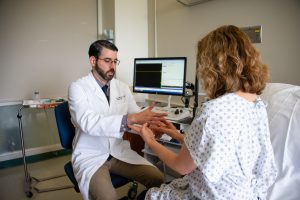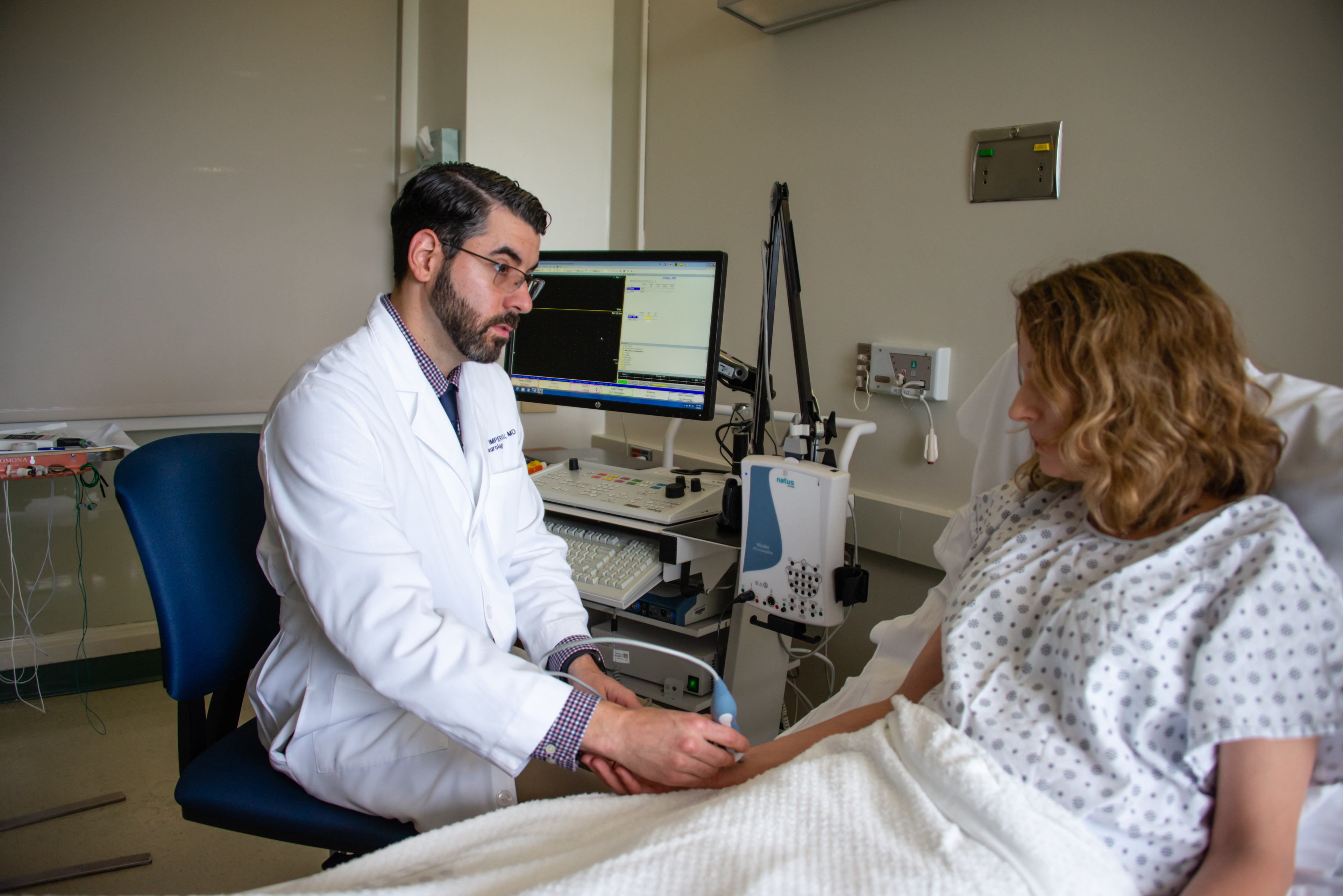It’s not just about the brain.
Did you know that neurologists also take care of nerve and muscle diseases?
UConn Health’s neuromuscular neurologists, technicians, and staff of the Department of Neurology have developed a new state-of-the-art Neuromuscular Center at UConn John Dempsey Hospital.
The Neuromuscular Center, within the Department of Neurology, is home to the Neuromuscular Diagnostic Laboratory, Autonomic Disorders Laboratory, and the Peripheral Neuropathy Program.
The dedicated neuromuscular team, led by Dr. Matthew Imperioli, also includes Drs. Fernanda Wajnsztajn, Catherine Alessi and Anthony Alessi, who manage the new Neuropathy Center, which is the only multidisciplinary clinic in the Greater Hartford area focused on the care of neuromuscular patients with peripheral nerve disease.

This group of board-certified and fellowship-trained physicians provides a full spectrum of diagnostic services to evaluate the peripheral nervous system through neuro-electromyography (EMG) as well as autonomic nervous system testing (ANS). The team collaborates with other specialists across neurology, neuropsychology, neuropathology, neurophysiatry and physical therapy to provide true multidisciplinary care.
In recognition of its high-quality care and services, the Neurodiagnostic Lab has been accredited by the American Association of Neuromuscular and Electrodiagnostic Medicine (AANEM) with exemplary status, the highest level of accreditation recognized by the organization.
“This accreditation with exemplary status by the AANEM is a testimony to the outstanding service and patient care provided by our talented neuromuscular physicians and EMG technicians,” says Dr. John Greenfield, chair of the Department of Neurology at UConn Health.
In addition, the Neuromuscular Center’s Peripheral Nerve Program at UConn Health specializes in helping those with peripheral neuropathy, a disorder causing progressive and persistent pain, weakness or tingling in the hands and feet. The multidisciplinary center is unique in that it provides patients one location to complete all their testing needs and meetings with several multidisciplinary experts.
At the first appointment, each patient meets with one of the specialists for an evaluation and an EMG. The EMG is a diagnostic procedure that evaluates the health of muscles and the nerve cells that control them. If needed, the patient will also see a physical therapist to have their balance and gait assessed as well as any lab and genetic testing that is required to provide a diagnosis.
“Assessing the whole patient with a multidisciplinary approach in one visit reduces weeks and months of follow up appointments to find a diagnosis and start a treatment plan,” says Imperioli.
Traversing the diagnosis of neuropathy can be very challenging. The most common cause of neuropathy is diabetes. Currently, over 10% of the population in the U.S. has diabetes and 45% of those patients have neuropathy, resulting in severe pain at the feet, numbness and increased risk of injury, infection and even amputation.
However, there are a multitude of other causes of peripheral neuropathy including hereditary disorders such as Charcot-Marie-Tooth disease, inflammatory and auto-immune diseases, infections, alcoholism and exposure to toxic chemicals. Even with extensive evaluation, the causes of peripheral neuropathy sometimes remain unknown, which is called idiopathic neuropathy.
“There is currently no cure for neuropathy, however, there are treatments and our goal is to stop disease progression and alleviate symptoms as quickly as possible to optimize patient outcomes,” says Imperioli.
The Neuromuscular Center is also a partner in care with the Myasthenia Gravis Foundation which has designated it as a site of excellence. “Our myasthenia gravis program offers the latest diagnostic testing and treatments,” says Imperioli.
“We also have expertise in disorders of the autonomic nervous system that can cause such problems as the absence of sweating, blood pressure instability, unexplained fainting, and postural orthostatic tachycardia syndrome (POTS). We diagnose these conditions in our state-of-the-art Autonomic Disorders Lab.” The UConn Autonomic Laboratory is the only such facility in the Greater Hartford area.



